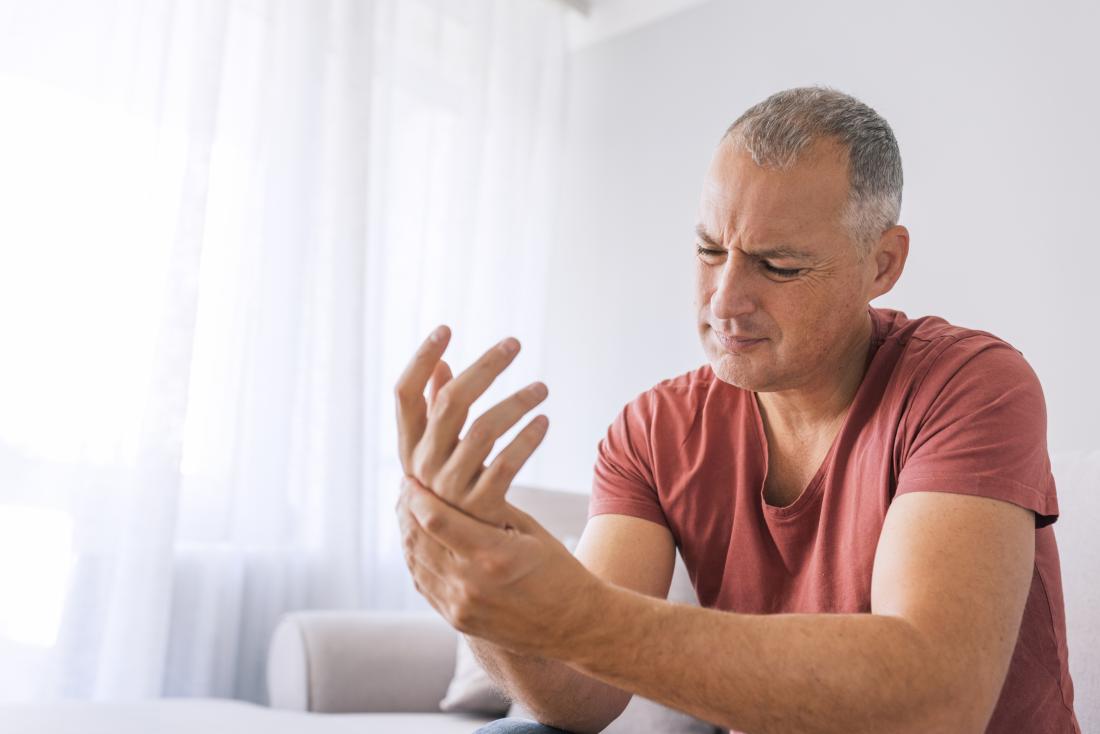In some cases, treatment may simply require a change in the way that a person uses their hands. However, medication or surgery may be necessary for cases with more complex underlying causes.
This article looks at six causes of numbness in a person’s fingers, as well as the treatment options.
1. Carpal tunnel syndrome

Carpal tunnel syndrome is one of the most common causes of numbness in a person’s fingers.
According to the American Society for Surgery of the Hand (ASSH), one of the most common causes of numbness in a person’s fingers is carpal tunnel syndrome.
The carpal tunnel is a passageway in the base of a person’s hand. The median nerve passes through it, and the pinching of this nerve can cause numbness, itching, or pain in the thumb, index finger, middle finger, and ring finger. Carpal tunnel syndrome often causes the hand to go numb while a person is sleeping because of the position that they hold it in.
To diagnose carpal tunnel syndrome, a doctor will take a detailed medical history, asking about any other conditions that a person has, how they use the wrist, and if they have experienced any prior injuries.
A person may be able to treat this condition by changing the way in which they use their hands.
For example, a person may get carpal tunnel syndrome because of how they sit at a desk while using a computer. Changing the chair, mouse, or keyboard that they use may resolve the issue.
Alternatively, a doctor may suggest that they temporarily wear a splint to prevent or reduce swelling. Splints help prevent the hand from going numb, especially at night.
If the symptoms are more severe or do not resolve with other treatments, a person may need steroid injections to reduce inflammation. In other cases, surgery may be necessary to create more room for the nerve to pass through the carpal tunnel.
2. Compression neuropathy
Compression neuropathy is when pressure on a nerve causes a loss of feeling and weak or twitchy muscles in parts of a person’s body. Carpal tunnel syndrome is a type of compression neuropathy.
According to the ASSH, a nerve may come under pressure due to an injury, enlarged blood vessels, the thickening of the muscles, or cysts that grow near a nerve.
A compressed nerve in the wrist, elbow, forearm, or neck can result in the loss of feeling in a person’s fingers.
People can make lifestyle changes to treat mild compression neuropathy. For example, creating a more ergonomic work station can improve neuropathy that has developed due to movements at work.
Physical or occupational therapy may be useful to relieve tight muscles that are compressing nerves. These types of therapy can also teach a person how to avoid causing symptoms in the future.
Obesity can also cause compression neuropathy, so losing weight may reduce symptoms.
A person with severe compression neuropathy might require surgery.
3. Peripheral neuropathy

Excessive alcohol consumption can lead a person to develop peripheral neuropathy.
According to the National Institute of Neurological Disorders and Stroke (NINDS), peripheral neuropathy refers to damage to a person’s peripheral nervous system. This system helps transmit signals across a person’s body.
Peripheral neuropathy can cause many different symptoms depending on the nerves that it affects. These symptoms may include the loss of feeling in the hands.
There are many causes of peripheral neuropathy. It can be either genetic, which means that a person inherits it from a biological parent, or acquired.
Causes of acquired peripheral neuropathy include:
There are many rarer underlying causes of peripheral neuropathy. A doctor may test for these once they have ruled out the common causes.
Treatment for peripheral neuropathy will depend on where the nerve damage occurs and the specific symptoms that the individual is experiencing.
4. Fibromyalgia
Fibromyalgia is a disorder that causes a person to have pain, numbness, and tingling in various parts of their body. Other common symptoms include:
- sleep problems
- fatigue
- memory issues
- difficulty concentrating or thinking
People who have fibromyalgia are more likely than other people to develop carpal tunnel syndrome.
5. Myofascial pain syndrome
Myofascial pain syndrome (MPS) is a musculoskeletal problem that can cause pain in the muscles or referred pain in other parts of the body.
The ASSH note that it can also cause numbness of the hands and forearms.
According to an article in the journal Pain and Therapy, there is limited evidence to support many of the current treatment options for MPS.
The authors suggest targeting the underlying cause of MPS until further research can lead to the development of specific, effective interventions.
6. Medications

A lack of vitamin B-1, as found in macadamia nuts, can cause numbness in the fingers.
The ASSH note that some medications, such as cancer treatment drugs, can cause tingling and numbness in a person’s hands. These side effects may be temporary or permanent.
According to the American Cancer Society, there is no sure way of preventing chemotherapy-induced peripheral neuropathy.
However, the medical team responsible for a person’s treatment will keep a close eye on this side effect and vary the medication dosage to try to manage it as best as possible.
Other causes
Other, less common causes of numbness in the fingers include:
Summary
There are many different possible causes of numbness in the fingers. This symptom may resolve without treatment or with minor lifestyle changes, depending on the underlying cause.
If the numbness does not go away, a person should speak to a doctor to determine the cause and the most suitable treatment.
